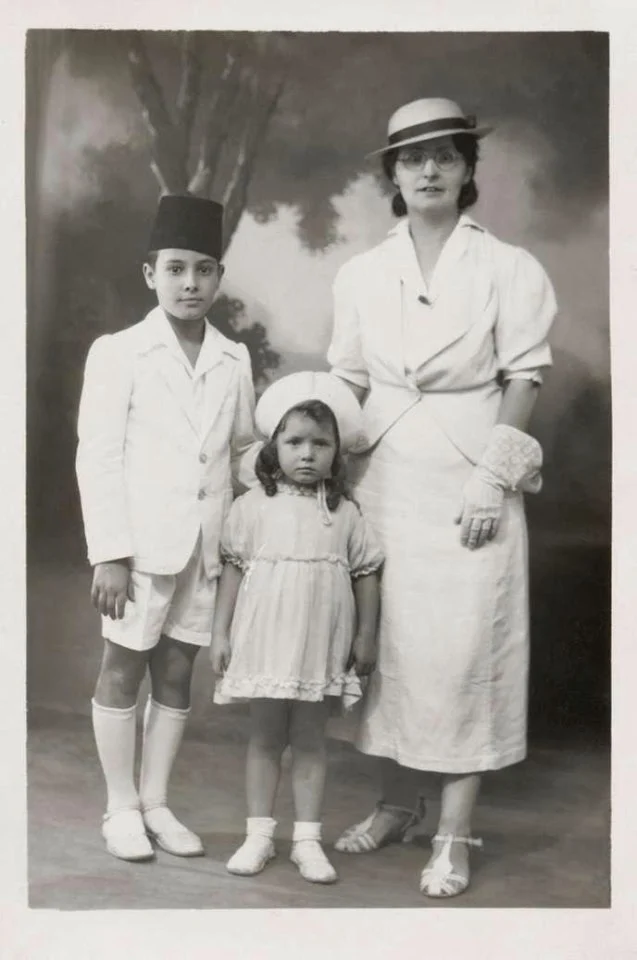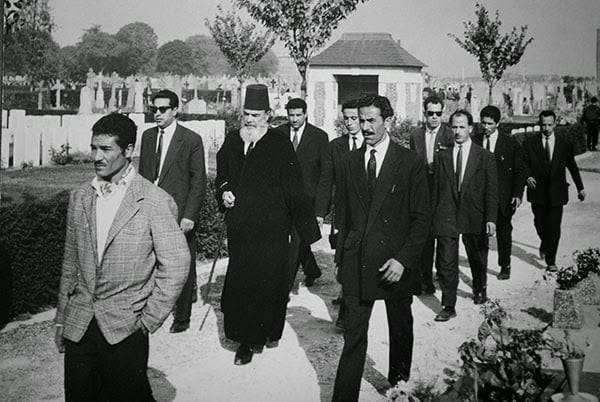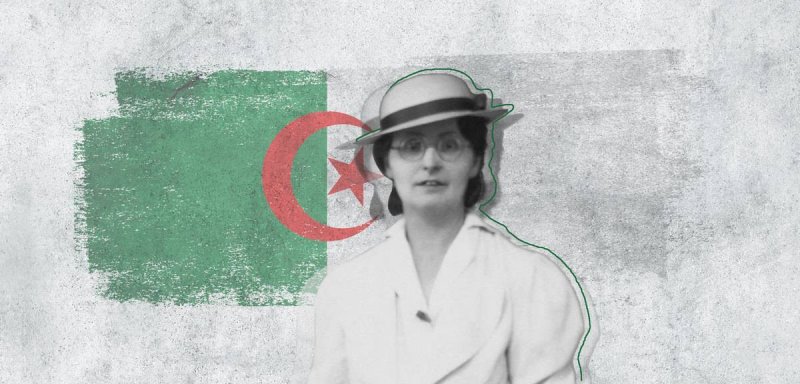Like other citizens of various nationalities, Algerians are proud of their flag and see it as a symbol of their homeland. But few know who Émilie Busquant is, the one who designed the Algerian flag, and whose name has been deliberately omitted from school curriculums and ignored by the Algerian official account altogether.

Who is Émilie Busquant?
In his novel "La Parfumeuse" on the life of Émilie Busquant, Algerian novelist Mohammed Benchicou describes the story of this woman's life as a story of love rather than a story of struggle. The love that linked her to the Algerian patriot, Messali Hadj, was undoubtedly a driver of those events.
Émilie, the daughter of a miner and trade unionist, was born in early 1902, in the suburb of Lorraine (northeastern France). She grew up in a home that politics was always present in, as her father, a simple miner, was a trade unionist par excellence and concerned with public affairs.
In the winter of 1923, a young Émilie working in the 'perfumes and women's products' department in Brioni, one of the oldest perfume shops in Paris, met the young Algerian Messali Hadj, who was at the time working in a Paris factory.
From that moment on, fate will weave the threads of the life of this 22-year-old French young woman with a young man from Tlemcen (western Algeria), who will play a vital role in the birth of the Algerian state.
In his memoirs, Messali Hadj describes Émilie with the words, "She was born in a hectic region of France, a revolutionary and patriotic at the same time, sharing with her family members the fate of an exploited and humiliated proletariat class."
Messali and Émilie got married in the autumn of 1925, after she accompanied him to his hometown of Tlemcen, where she learned Arabic and they had their two children, Ali and Jenina.
Émilie soon integrated into her husband's world and became involved in his political activities, which rose in pace after he co-founded the first nationalist political movement demanding the independence of Algeria, known as the "North African Star". Émilie was not only in solidarity or sympathetic with the movement, but was an important actor in its activities, so much so that Émilie wrote the movement’s letters addressed to the League of Nations in January 1930, to draw its attention to the Algerian issue, in addition to her participation in many demonstrations, whether in Algeria or in France.
Even though she created the Algerian flag that ignited the revolution, she died alone and forgotten, and was not even mentioned by historians
The story of the Algerian flag
Historians disagree as to whether Émilie Busquant is the one who sewed the Algerian flag, or not.
Raseef22 posed this question to Algerian history professor Hakim Messaoudi, and he replied, “The issue of designing the Algerian flag isn’t settled by a definitive source, as there is a conflict in the testimonies, and historians did not attach importance to the details of the issue, even though some historical writings tried to present the historical material and testimonies that were found. The most prominent of them is French historian Benjamin Stora, who confirmed that Émilie Busquant was the one who sewed the Algerian flag after agreeing to design it in the North African Star political office, thus creating the drawing on the cloth that her husband bought specifically for that purpose.

In his memoirs, Messali Hadj’s testimony corroborates this narrative. He says, "My wife told us that she had sewed a flag while she was in Tlemcen and then she hid it. The problem was how to get this flag to Algeria at the right time, so we spoke on the phone to Tlemcen on July 12, and we asked our friends to do everything in their power to deliver it to us." Messali then adds, "After a long wait, it arrived on the eve of July 13 to us. I cannot describe our joy at the time."
As for the first time the Algerian flag appeared to the public, it was on August 5, 1934, Messali Hadj says, "More than 800 Algerians attended the general assembly of the organization, and the meeting was of great importance because for the first time, the Algerian flag was presented in green and white along with a crescent and a star in red in its middle. It was met with great enthusiasm, as the crowd did not stop singing and clapping, with rising chants that shook the hall: 'Long live Algeria... Long live independence',"
This flag will reappear in several demonstrations, in Algeria and France, but its most symbolic appearance was when it was raised by the young demonstrator Mohamed Bouras in the city of Sétif (eastern Algeria) on May 8, 1945, during popular demonstrations that included many Algerian cities calling for independence after the Algerians supported France in World War II against Nazism. Those demonstrations turned into a massacre that ignited the liberation revolution demanding the independence of Algeria.
A sad end
Busquant continued the cause and struggle with her husband until her very last breath. She continued to correspond and write letters to her husband throughout his imprisonment and isolation under house arrest, until she died pretty much alone in October 1953, a year before the outbreak of the Algerian revolution, after falling terminally ill.
A year before her death, she wrote to Messali Hadj, who was placed under house arrest in Niort in France, these words: "Oh God, why am I such a sick, old woman? I wish I could get up to hear the cries of a nation that does not want to die and will not die. What a shame. The French people now know what is happening. Perhaps they will do something more than solidarity, but shame will haunt France. History will never forget these facts. I do not want to die before I see Algeria's independence. It's inevitable."
How did the nationalist activist and patriot Messali Hadj turn from a hero to a prisoner?
Why did Algeria ignore Émilie Busquant?
Despite the important role Busquant played in Algerian history, any mention of her is almost completely forgotten in the history curriculums or historical writings, personalities, dates, and titles of official seminars that have to do with the struggle of the Algerian people during the colonial period. Speaking to Raseef22, history professor Hakim Massoudi attributes the reason to the enormity of Messali Hadj as a historical figure, which may have overshadowed any mention of his wife who had always remained in his shadow, like many other prominent figures who remained loyal to Messali in the People's Party and did not join the liberation revolution led by the National Liberation Front of Algeria.
It should be noted here that the name of Messali Hadj himself was banned in Algeria, due to his independent positions on managing the liberation revolution, until his stature was reinstated by the late Algerian President Abdelaziz Bouteflika.
Messali Hadj had refused to join the young people who sparked the revolution of November 1, 1954 against France, most of whom had previously been active within the political and armed organizations he had established. It all ended with fighting between members of Algeria’s National Liberation Front and activists who remained faithful to Messali Hadj’s directives that rejected the armed revolution.
After the independence, estrangement and alienation remained rooted between the politicians who ruled Algeria, all of whom belonged to the National Liberation Front and members of the People's Party, or the "Messaliyeen" as they are called. The Algerian authorities did not grant the Algerian citizenship to Messali Hadj until 1965, before he died in France in the seventies, far from his beloved homeland.
It is not possible to say for sure whether it was Messali's presence that overshadowed Émilie’s name, or whether the concealment of her historical role came as a punishment for her husband, but what is certain is that history in Algeria has not received its due research and study to this day.
Raseef22 is a not for profit entity. Our focus is on quality journalism. Every contribution to the NasRaseef membership goes directly towards journalism production. We stand independent, not accepting corporate sponsorships, sponsored content or political funding.
Support our mission to keep Raseef22 available to all readers by clicking here!
Interested in writing with us? Check our pitch process here!





